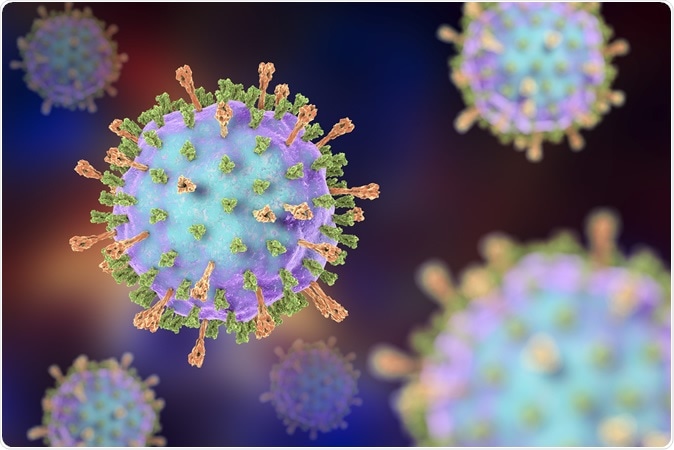Mumps is a contagious condition affecting the parotid glands. In some cases, mumps can lead to complications, especially in men, including sterility. Other serious complications of mumps include meningitis, encephalitis, and pancreatitis. There is a readily available vaccine against mumps, but despite this, there has been a sharp rise in mumps cases in England.
The increase in cases of mumps has risen to the highest level in ten years, prompting health officials to encourage teenagers and young adults to undergo immunization against the virus, especially for those with missed vaccines.

This image depicts a child with a mumps infection. Note the characteristic swollen neck region due to an enlargement of the boy’s salivary glands. Credit: CDC
Increase in cases
In 2019, there had been more than 5,000 cases of mumps in England, compared to just 1,000 the previous year.
Health officials predict that the increase in cases will continue in 2020, with more than 500 occurrences in January 2020, compared to just 191 during the same period last year.
The sudden increase of cases is alarming, and health experts believe it has something to do with people providing anti-vax information to patients. Anti-vaxxers have influenced many people against immunizations.
Importance of immunization
Being immunized against infectious disease is crucial because it prevents most, though not all, cases of mumps. Further, it prevents serious complications tied to mumps. One of the most known complications is the possibility of sterility in men since the virus causes orchitis or the inflammation of the testicles.
The other complications a person can get from mumps are encephalitis or the inflammation of the brain, which is life-threatening, meningitis, the inflammation of the meninges in the brain, and pancreatitis, or the inflammation of the pancreas. In some cases, mumps has been tied to complications, including hearing loss, miscarriage in early pregnancy, and heart problems.
Teens and young adults are recommended to receive the mumps jab to prevent the complications tied to the disease.
The vaccine is usually given at 12 to 13 months, with a booster shot before school entry at about three-to-four years old. To be fully protected from the disease, two doses are needed. For adults who haven’t received the jab or just had one dose in childhood, it’s not too late to get the vaccine.
Trials have shown about 99 percent of people will be protected against measles and rubella after two doses of the vaccine called MMR (mumps measles rubella) vaccine. For mumps, the protection is 88 percent.
What is mumps?
Mumps is a highly contagious illness caused by a virus. The Centers for Disease Control and Prevention (CDC), reports that mumps starts with a fever, muscle pains, fatigue, loss of appetite, and headache. After developing these symptoms, the inflammation of the salivary glands occurs, which causes jaw swelling and puffy cheeks.

Mumps virus. 3D illustration showing structure of mumps virus with surface glycoprotein spikes heamagglutinin-neuraminidase and fusion protein. Image Credit: Kateryna Kon
The condition usually affects the parotid glands, the glands that produce saliva, which is located front and beneath the ear.
Mumps spread the virus the same way as colds and flu, through infected droplets when people cough or sneeze. Further, mumps is still infectious a few days before the symptoms manifest. The best way to contain the virus is to prevent it from spreading to others through regular handwashing, using disposable tissue when you sneeze, and stay at home for at least five days after the symptoms developed.
Sources:
Kmietowicz, Z. (2020). Unvaccinated “Wakefield cohorts” blamed for 5000 cases of mumps in England last year. The BMJ. https://www.bmj.com/content/368/bmj.m619.full
Centers for Disease Control and Prevention (CDC). (2020). Mumps. https://www.cdc.gov/mumps/index.html
National Health System (NHS). (2020). Mumps Overview. https://www.nhs.uk/conditions/mumps/